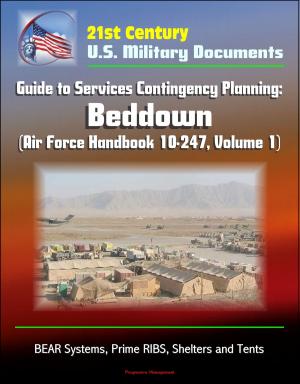The Impact of Pro-Government Militias on State and Human Security: A Comparative Analysis of the Afghan Local Police in Kunduz Province, and the Janjaweed in Sudan - Militia Histories
Nonfiction, History, Military, Social & Cultural Studies, Political Science| Author: | Progressive Management | ISBN: | 9780463937570 |
| Publisher: | Progressive Management | Publication: | June 12, 2018 |
| Imprint: | Smashwords Edition | Language: | English |
| Author: | Progressive Management |
| ISBN: | 9780463937570 |
| Publisher: | Progressive Management |
| Publication: | June 12, 2018 |
| Imprint: | Smashwords Edition |
| Language: | English |
This important 2018 report has been professionally converted for accurate flowing-text e-book format reproduction.
How do pro-government militias impact state and human security? Throughout the world, governments are more frequently interacting with and employing armed groups and militias in order to increase their security and position through unofficial means. Additionally, throughout the current academic literature, there are significant disagreements on the impacts of pro-government militias on state and human security. This thesis examines the relationship and impact of pro-government militias on state and human security by conducting a comparative analysis on two recent pro-government militias, the Afghan Local Police in Afghanistan and the Janjaweed in Sudan. The resulting analysis of this research generates two major theses: First, that the use of pro-government militias can provide limited increases in security to the principal who employed them; second, that we should expect to see an inverse relationship between pro-government militia employment and human security. This study also identifies several areas where the international community should focus, in order to understand how current or future pro-government militias may impact state and human security.
I. INTRODUCTION * A. MAJOR RESEARCH QUESTION * B. SIGNIFICANCE OF THE RESEARCH * C. LITERATURE REVIEW * 1. Pro-government Militias: Definitions and Typologies * 2. The Principal-Agent Dilemma and the Deniability of Militias * 3. Pro-government Militias: Monopoly of Force and Regime Security * 4. Pro-government Militias and Human Security * D. POTENTIAL EXPLANATIONS AND HYPOTHESES * E. RESEARCH DESIGN * F. THESIS OVERVIEW * II. THE AFGHAN LOCAL POLICE * A. INTRODUCTION * B. HISTORY OF MILITIAS IN AFGHANISTAN * C. THE DECISION TO ESTABLISH THE AFGHAN LOCAL POLICE * 1. Factors leading up to the Establishment of the ALP * 2. Mission and Formal Establishment * 3. Recruitment, Training, and Expansion * D. THE IMPACT OF THE AFGHAN LOCAL POLICE ON STATE SECURITY AND STABILITY * 1. A Case for a Positive Impact * 2. A Case for a Negative Impact * 3. Analysis of the Overall Impact of the ALP on State Security * E. THE IMPACT OF THE AFGHAN LOCAL POLICE ON HUMAN SECURITY * 1. Example Cases of Human Rights Violations by the ALP * 2. The Importance of the Locality and Localized Group Dynamics * 3. Analysis of the Overall Impact of the ALP on Human Security * F. THE AFGHAN LOCAL POLICE IN KUNDUZ PROVINCE * G. CONCLUSION * III. THE JANJAWEED * A. INTRODUCTION * B. BACKGROUND * 1. A Brief History of Darfur * 2. A History of Militia Use and Khartoum's Militia Strategy * 3. Factors Leading to 2003 Conflict * C. THE DECISION TO EMPLOY THE JANJAWEED * 1. Onset of the Conflict and the Impact of Early Governmental Losses * 2. The Benefit of the Janjaweed's Deniability and "Out of Control" Nature to the GoS * 3. Analysis of Why the GoS Decided to Utilize the Janjaweed * D. THE IMPACT OF THE JANJAWEED ON STATE SECURITY * 1. A Case for a Positive Impact * 2. A Case for a Negative Impact * 3. Analysis of the Overall Impact of the Janjaweed on State Security * E. THE IMPACT OF THE JANJAWEED ON HUMAN SECURITY * 1. Example Cases and Characterizations of Human Rights Violations * 2. The Importance of the Locality and Localized Group Dynamics * 3. Analysis of the Overall Impact of the Janjaweed on Human Security * F. CONCLUSION * IV. COMPARATIVE ANALYSIS AND OVERALL IMPLICATIONS * A. COMPARATIVE ANALYSIS * 1. Research Questions and Hypothesis Evaluated * 2. Limits of the Analysis and Future Research * B. OVERALL IMPLICATIONS OF THE ANALYSIS
This important 2018 report has been professionally converted for accurate flowing-text e-book format reproduction.
How do pro-government militias impact state and human security? Throughout the world, governments are more frequently interacting with and employing armed groups and militias in order to increase their security and position through unofficial means. Additionally, throughout the current academic literature, there are significant disagreements on the impacts of pro-government militias on state and human security. This thesis examines the relationship and impact of pro-government militias on state and human security by conducting a comparative analysis on two recent pro-government militias, the Afghan Local Police in Afghanistan and the Janjaweed in Sudan. The resulting analysis of this research generates two major theses: First, that the use of pro-government militias can provide limited increases in security to the principal who employed them; second, that we should expect to see an inverse relationship between pro-government militia employment and human security. This study also identifies several areas where the international community should focus, in order to understand how current or future pro-government militias may impact state and human security.
I. INTRODUCTION * A. MAJOR RESEARCH QUESTION * B. SIGNIFICANCE OF THE RESEARCH * C. LITERATURE REVIEW * 1. Pro-government Militias: Definitions and Typologies * 2. The Principal-Agent Dilemma and the Deniability of Militias * 3. Pro-government Militias: Monopoly of Force and Regime Security * 4. Pro-government Militias and Human Security * D. POTENTIAL EXPLANATIONS AND HYPOTHESES * E. RESEARCH DESIGN * F. THESIS OVERVIEW * II. THE AFGHAN LOCAL POLICE * A. INTRODUCTION * B. HISTORY OF MILITIAS IN AFGHANISTAN * C. THE DECISION TO ESTABLISH THE AFGHAN LOCAL POLICE * 1. Factors leading up to the Establishment of the ALP * 2. Mission and Formal Establishment * 3. Recruitment, Training, and Expansion * D. THE IMPACT OF THE AFGHAN LOCAL POLICE ON STATE SECURITY AND STABILITY * 1. A Case for a Positive Impact * 2. A Case for a Negative Impact * 3. Analysis of the Overall Impact of the ALP on State Security * E. THE IMPACT OF THE AFGHAN LOCAL POLICE ON HUMAN SECURITY * 1. Example Cases of Human Rights Violations by the ALP * 2. The Importance of the Locality and Localized Group Dynamics * 3. Analysis of the Overall Impact of the ALP on Human Security * F. THE AFGHAN LOCAL POLICE IN KUNDUZ PROVINCE * G. CONCLUSION * III. THE JANJAWEED * A. INTRODUCTION * B. BACKGROUND * 1. A Brief History of Darfur * 2. A History of Militia Use and Khartoum's Militia Strategy * 3. Factors Leading to 2003 Conflict * C. THE DECISION TO EMPLOY THE JANJAWEED * 1. Onset of the Conflict and the Impact of Early Governmental Losses * 2. The Benefit of the Janjaweed's Deniability and "Out of Control" Nature to the GoS * 3. Analysis of Why the GoS Decided to Utilize the Janjaweed * D. THE IMPACT OF THE JANJAWEED ON STATE SECURITY * 1. A Case for a Positive Impact * 2. A Case for a Negative Impact * 3. Analysis of the Overall Impact of the Janjaweed on State Security * E. THE IMPACT OF THE JANJAWEED ON HUMAN SECURITY * 1. Example Cases and Characterizations of Human Rights Violations * 2. The Importance of the Locality and Localized Group Dynamics * 3. Analysis of the Overall Impact of the Janjaweed on Human Security * F. CONCLUSION * IV. COMPARATIVE ANALYSIS AND OVERALL IMPLICATIONS * A. COMPARATIVE ANALYSIS * 1. Research Questions and Hypothesis Evaluated * 2. Limits of the Analysis and Future Research * B. OVERALL IMPLICATIONS OF THE ANALYSIS















